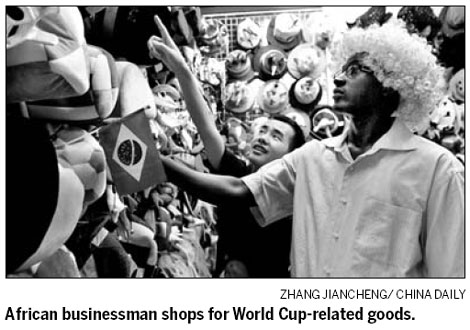Economy
Blaring World Cup vuvuzela yields only bland profits
By Lu Wei (China Daily)
Updated: 2010-07-07 10:31
 |
Large Medium Small |

The controversial vuvuzela plastic horn that is causing enormous noise - and some say annoyance - at the ongoing FIFA World Cup in South Africa offered opportunities for Chinese manufacturers, but only narrow profit margins due to the lack of intellectual property.
About 90 percent of the blaring instruments blown by soccer fans were made in China, said Wu Yijun, manager of the Ninghai Jiying Plastics Manufacturing Co in Zhejiang province, the biggest vuvuzela maker in China.
Wu said his company made more than 1 million vuvuzelas for export from the beginning of this year to April at prices ranging from 0.6 yuan to 2.5 yuan each. They are being sold for between 18 yuan and 53 yuan in South Africa, with the highest price, 177 yuan, on offer in big department stores.
"Most of the profit goes to dealers and importers. Our profit margin is less than 5 percent," Wu said. "We still don't have international pricing power."
The biggest problem for China's manufacturing industry is the lack of strong brands, copyrights and patents, Wu said.
Many Chinese manufacturers make outsourced equipment manufacturing (OEM) products that are ultimately sold as other, often foreign, brands.
Up to five companies - mainly located in Ningbo of Zhejiang province and Shantou in Guangdong - made the vuvuzela, Wu said.
| ||||
Such small margins were due to a lack of patents or failure to register trademarks, said Zheng Yumin, director general of Zhejiang Administration for Industry and Commerce.
Developing intellectual property is crucial for domestic companies to make money in international markets, Zheng noted.
If Chinese enterprises want to gain more power in pricing, they should make greater efforts to achieve the goal of "created in China" rather than just "made in China", he said.
OEM should only be a temporary expedient, not a long-term development model, said Zhang Ping, professor of the Intellectual Property Institute at Peking University.
She said long-term OEM actually has a negative impact on a manufacturer's capacity for innovation.
"Currently, our most important task is transition. It means we must increase the technological content of products, get more intellectual property rights and establish our own brands," said vuvuzela maker Wu.



